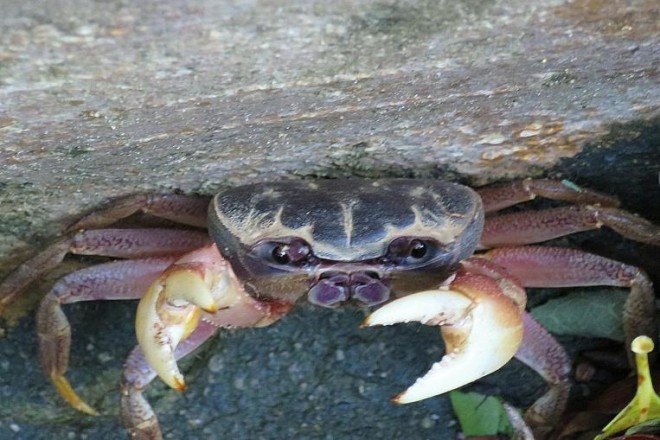Land crab sighted in Singapore after 7 decades

A female specimen was found in a drain on St John’s Island by a Tropical Marine Science Institute scientist. COMPREHENSIVE MARINE BIODIVERSITY SURVEY / STRAIGHTSTIMES
After an absence of over 70 years, the brown land crab has clawed its way back onto the shores of Sinagpore.
A female specimen – about 10cm from pincer to pincer – was spotted earlier this month sitting on a mound of leaf litter in a small drain on St. John’s Island.
The last time this crab was seen here was in 1938, in Paya Lebar, said crab expert Peter Ng.
“It has never been seen since, and is regarded as locally extinct,” said Professor Ng, chief of the Lee Kong Chian Natural History Museum at the National University of Singapore (NUS). “So to see the crab again on St. John’s Island is wonderful. The crab has either been hiding there for decades, or has returned to Singapore after a long hiatus! The important thing is, it is no longer extinct.”
Also known by its scientific name Discoplax hirtipes, the crab has a wide distribution in Southeast Asia and the western Pacific. It comes from the same family as the Christmas Island red crab.
Article continues after this advertisementProf. Ng said the brown land crab lives in coastal habitats, digging burrows under rocks and vegetation, but can sometimes be found many kilometers inland. However, he added, they reproduce by releasing larvae into the open sea. This is different from freshwater crabs, which have large eggs and hatch into miniature versions of the adult.
Article continues after this advertisementAssistant Professor Darren Yeo from the NUS department of biological sciences said that as the species frequents coastal areas and needs to return to the sea to spawn, its appearance after more than 70 years shows that efforts to protect coastal and marine environments are worthwhile.
“This also reminds us that species thought to be locally extinct but still occurring in the surrounding region may possibly have a chance to make a return,” he said.
As the crab was an “incidental find”, the first thing to do would be to see if this was a one-off record or if there are more on St John’s Island, or other parts of Singapore, he said. “We should probably also consider if this ‘re-discovery’ could be attributed to increased sampling effort or increased general awareness of our local fauna and of unusual sightings, and missing it previously was because the persisting or surviving population was very small and in isolated areas.”
Tropical Marine Science Institute (TMSI) senior research fellow Tan Koh Siang, who made the find, said the crab had attracted the curiosity of many TMSI staff, who had taken photos of it. “We collected the crab by coaxing it into a paper bag and sent (Prof Ng) a photograph on e-mail,” said Dr. Tan.
He added: “I did what any zoologist would have done on seeing something out of the blue!”
The crab was featured recently at the opening of the new Sisters’ Islands Marine Park Public Gallery, and has since been returned to the museum.
TMSI deputy director Serena Teo said: “This is an important taxonomic record. Prof. Ng and his team may also want to examine it more closely and take DNA samples to check.”
RELATED STORIES
Delicious chunks of crab meat–in a tin can